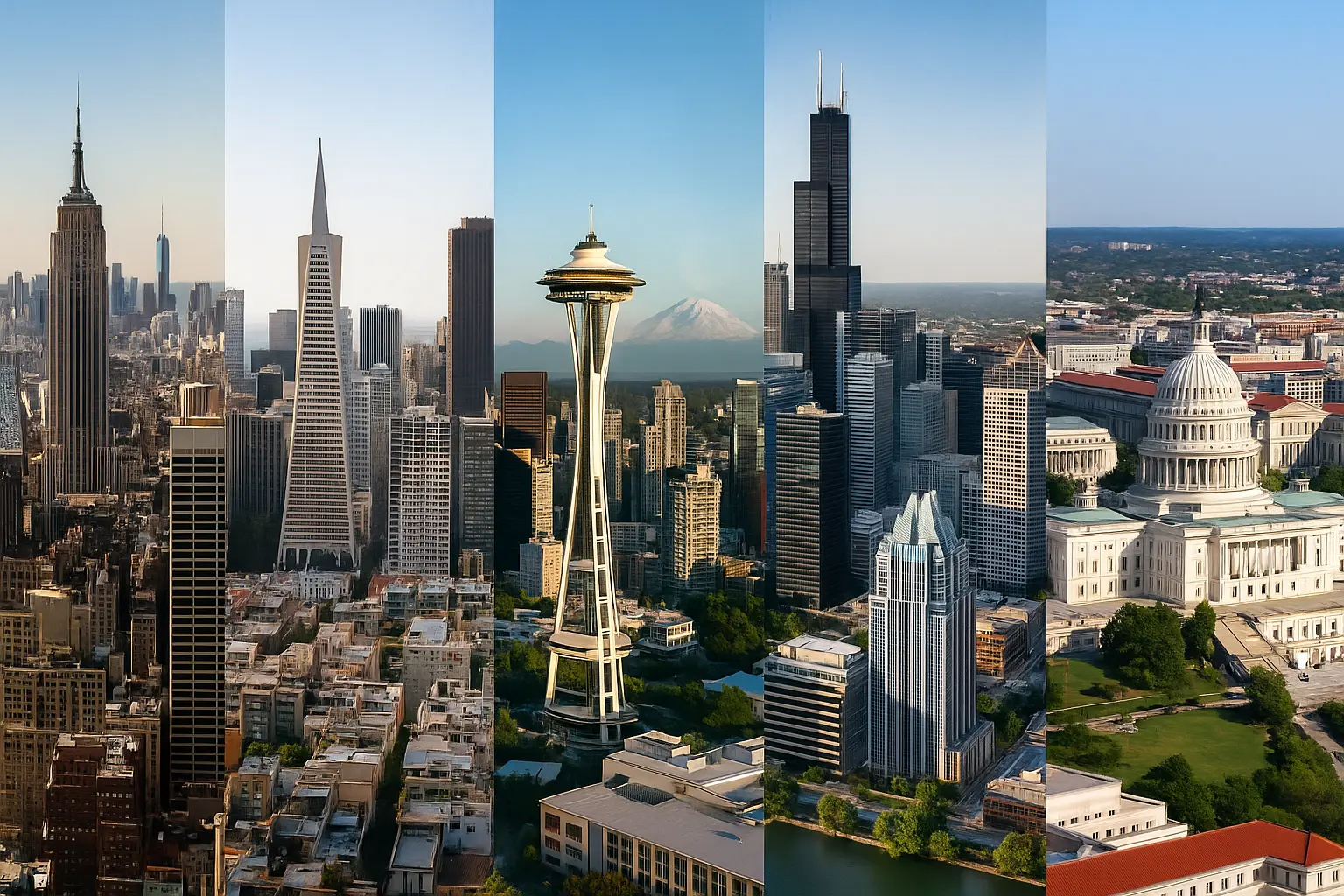The tech job market continues to evolve rapidly across the United States. After analyzing more than 25,000 tech job postings from the past six months using data from JobRight, Frog Hire, and AI automation tools, I’ve identified the nine cities leading the tech employment landscape in 2025. This comprehensive data analysis reveals surprising trends in tech job distribution and specialization across the country.
Table of Contents
The Unexpected Tech Job Landscape Across America
The distribution of tech jobs across American cities shows some surprising patterns. While traditional tech hubs maintain strong positions, emerging cities are rapidly climbing the ranks, offering new opportunities for tech professionals in software engineering, AI/ML, product management, technical program management, data analysis, data science, DevOps, and cloud engineering.
This analysis provides valuable insights for job seekers planning their next career move or relocation. Let’s explore which cities are dominating the tech job market and what specializations they’re known for.
Data Collection Methodology
This ranking isn’t based on subjective opinions but on hard data from over 25,000 actual job postings across major job boards. Using advanced scraping techniques and AI analysis, I’ve compiled a comprehensive picture of where tech jobs are actually being created, not where conventional wisdom suggests they might be.
The Rising Star: Dallas at #9
Dallas, Texas has emerged as a significant tech hub, though its position at number nine might surprise those familiar with its business-friendly environment and growing tech ecosystem.
Why Dallas is Gaining Momentum
- Tax Advantages: No state income tax makes it attractive for both businesses and tech workers
- Traditional Strength: Well-established in telecommunications and energy sectors
- Emerging Specializations: Growing rapidly in fintech, cybersecurity, and software development
- Corporate Presence: Home to numerous Big Four consulting tech operations
Dallas offers a relatively affordable cost of living compared to coastal tech hubs, though prices are rising as the tech sector expands. The city’s business-friendly policies continue to attract companies looking to establish or expand their tech operations.
Boston: The Historic Innovation Center at #8
Boston ranks eighth on our list, combining historic charm with cutting-edge innovation powered by its world-class academic institutions.
Boston’s Tech Specializations
- Biotech and Healthcare Technology: Leading the nation in medical technology innovation
- Robotics: Home to pioneering robotics research and development
- Artificial Intelligence: Experiencing rapid growth in AI startups and research initiatives
- Academic Pipeline: Benefits from talent from MIT, Harvard, and other prestigious institutions
Boston’s tech ecosystem benefits from the constant influx of talent from its renowned universities and research facilities, creating a self-sustaining cycle of innovation particularly in specialized technical fields.
Atlanta: The Underrated Powerhouse at #7
Atlanta secures the seventh position and is growing faster than many realize, nearly matching the sixth-ranked city in job creation.
Atlanta’s Tech Strengths
- Fintech Hub: Home to numerous financial technology companies and startups
- Cybersecurity Focus: Developing as a center for cybersecurity innovation
- Academic Support: Powered by Georgia Tech and Georgia State University talent
- Transportation Advantage: International airport connectivity facilitates business growth
- Diverse Tech Ecosystem: Supporting varied tech specializations and company sizes
Atlanta’s combination of affordable living costs, quality educational institutions, and growing startup ecosystem makes it an increasingly attractive destination for tech professionals.
Washington DC: Beyond Politics at #6
Washington DC ranks sixth, demonstrating that the nation’s capital offers far more than government jobs.
DC’s Tech Specializations
- Cybersecurity Dominance: Leading center for cybersecurity innovation and implementation
- Government Technology: Pioneering advancements in public sector technology
- DMV Advantage: Tech opportunities span DC, Maryland, and Virginia
- Sector Diversity: Strong in public sector, private industry, fintech, and healthcare technology
Contrary to popular belief, international students and professionals can find numerous opportunities in the DC tech sector, particularly with private companies serving various industries, including government contractors with appropriate work authorization paths.
Chicago: The Midwest Tech Leader at #5
Chicago secures the fifth position, demonstrating the Midwest’s growing importance in the tech landscape.
Chicago’s Tech Ecosystem
- Data Analytics Hub: Leading center for big data analytics innovation and implementation
- Fintech Strength: Home to major financial technology operations including Discover Card
- Aviation Technology: Significant presence of airline technology operations
- Healthcare Tech: Growing sector for medical and healthcare technology
- Supply Chain Technology: Leveraging the Midwest’s industrial base for logistics tech
Chicago combines reasonable living costs with a diverse economy, making it an attractive alternative to coastal tech hubs while still offering world-class opportunities.
Austin: The Surprising Contender at #4
Austin’s fourth-place ranking represents one of the most dramatic rises in the American tech landscape over the past decade.
Austin’s Explosive Growth Factors
- Corporate Relocations: Major companies like Tesla and Oracle establishing headquarters
- Tax Benefits: No state income tax attracting businesses and workers
- Startup Ecosystem: Rapidly expanding startup community across multiple tech sectors
- Property Value Surge: Housing costs nearly doubling in five years (from $300,000 to $550,000 for comparable properties)
- Entrepreneurial Culture: Attracting founders and innovators from across the country
Austin’s transformation from a relatively unknown tech market to a major player demonstrates how quickly the tech landscape can evolve, creating new opportunities for professionals willing to look beyond traditional hubs.
Seattle: Innovation Powerhouse at #3
Seattle claims the third position, cementing its status as one of America’s premier tech destinations.
Seattle’s Tech Advantages
- Tech Giants: Home to Amazon and Microsoft headquarters
- Tax Benefits: No state income tax in Washington state
- Innovation Culture: Strong emphasis on technological advancement and research
- Startup Ecosystem: Vibrant community of startups across multiple tech sectors
- Tech-Focused Community: Areas like Redmond known for ambitious, tech-driven culture
Seattle’s combination of established tech giants and emerging startups creates abundant opportunities across the tech spectrum, from entry-level positions to senior leadership roles.
Bay Area: The Historic Tech Mecca at #2
The Bay Area’s second-place position might surprise those who assume Silicon Valley automatically dominates tech employment.
Silicon Valley’s Continued Strength
- Tech Diversity: Encompasses multiple cities including San Francisco, Santa Clara, and Fremont
- Innovation Leadership: Continues to lead in cutting-edge technology development
- Venture Capital Access: Unparalleled access to investment funding
- Talent Concentration: Highest density of tech professionals in the country
- Specialization Breadth: Strong across virtually all tech sectors and specializations
While no longer holding the top position, the Bay Area remains just 5-10% behind the leader in total tech job postings, demonstrating its continued importance in the tech ecosystem.
New York City: The Unexpected Tech Leader at #1
New York City claims the top position for tech job opportunities, challenging conventional wisdom about where tech professionals should focus their job search.
NYC’s Tech Dominance Factors
- Sector Diversity: Leading in fintech, healthtech, adtech, media tech, and marketing technology
- Corporate Headquarters: Home to numerous major tech operations across multiple industries
- Talent Magnetism: Attracts professionals from across the globe
- Industry Convergence: Technology intersecting with finance, healthcare, media, and other NYC-strong sectors
- Job Volume: Highest total number of tech job postings across analyzed categories
New York’s strength comes from the breadth of its tech opportunities across multiple industries, creating a diverse ecosystem that supports various career paths and specializations.
How to Leverage This City Ranking in Your Job Search
Understanding where tech jobs are concentrated helps you make strategic career decisions. Consider these factors when planning your next move:
- Specialization Alignment: Target cities known for your specific tech specialty
- Cost of Living Balance: Compare salary offers against local living costs
- Growth Trajectory: Consider not just current rankings but growth trends
- Visa and Immigration: Research which markets have employers more open to sponsorship
- Personal Preferences: Factor in climate, culture, and lifestyle preferences alongside job opportunities
Explore tech job opportunities across all these cities on WhatJobs
FAQ: Top US Cities for Tech Jobs
What methodology was used to determine the top US cities for tech jobs in 2025?
The top US cities for tech jobs ranking is based on comprehensive data analysis of over 25,000 actual tech job postings collected over the past six months. Unlike subjective rankings found elsewhere, this analysis used advanced scraping techniques with JobRight, Frog Hire, and AI automation tools to gather real job listings across major job boards. The data specifically focused on positions in software engineering, AI/ML, product management, technical program management, data analysis, data science, DevOps, and cloud engineering. Each job was geolocated to its respective city, and the total volume of postings was analyzed to create the final ranking. This data-driven approach provides an accurate snapshot of where tech jobs are actually being created in 2025, rather than relying on reputation or historical trends that may no longer reflect current market conditions.
Why did New York City rank higher than the Bay Area for tech jobs in 2025?
New York City ranked higher than the Bay Area for tech jobs in 2025 due to several key factors revealed in our data analysis. While the Bay Area has traditionally been viewed as America’s primary tech hub, New York’s tech job market has expanded dramatically through the diversification of tech roles across multiple industries. The city’s strength in financial services has created a booming fintech sector, while its media industry has spawned numerous adtech and marketing technology positions. Additionally, New York’s healthcare institutions have generated significant healthtech opportunities. When analyzing the full spectrum of tech roles including product managers, technical program managers, and data analysts (not just software engineering positions), New York edged out the Bay Area by approximately 5-10% in total job postings. This reflects New York’s advantage in offering tech opportunities across diverse industries rather than primarily in pure technology companies, creating a more resilient and varied job market for tech professionals in 2025.
What types of tech specializations are most in demand across the top US cities for tech jobs?
The most in-demand tech specializations across the top US cities for tech jobs show both common patterns and regional variations. Data analysis reveals that artificial intelligence and machine learning roles are experiencing explosive growth in all nine cities, with particularly strong demand in New York, the Bay Area, and Boston. Cloud engineering positions dominate in Seattle, reflecting the influence of Amazon and Microsoft’s cloud platforms. Cybersecurity specialists are highly sought after in Washington DC, Atlanta, and Dallas, while fintech expertise is at a premium in New York, Chicago, and Atlanta. Product management roles show strong demand across all markets but are particularly concentrated in New York and the Bay Area. Data science and analytics positions appear consistently across all nine cities but show the highest concentration in Chicago and New York. Healthcare technology specialists are most in demand in Boston and New York. These specialization patterns reflect each city’s unique industry landscape and can help tech professionals align their skills and career goals with locations offering the greatest opportunities in their field.
How does cost of living compare across the top US cities for tech jobs in 2025?
Cost of living varies significantly across the top US cities for tech jobs in 2025, creating important considerations for job seekers weighing salary offers. The Bay Area and New York City maintain the highest cost of living indexes, with housing costs in particular reaching extraordinary levels—median home prices exceed $1.5 million in parts of Silicon Valley and Manhattan. Seattle and Boston follow as high-cost markets, though still approximately 15-20% below the most expensive areas. Washington DC and Austin occupy a middle tier, with Austin showing the fastest cost increase among all nine cities (nearly doubling housing costs in five years). Chicago offers a more moderate cost structure while still providing big-city amenities. Atlanta and Dallas represent the most affordable options among the top tech cities, with housing costs roughly 60-65% lower than in the Bay Area while still offering competitive tech salaries. Tax considerations add another dimension, with Texas and Washington residents benefiting from no state income tax. Tech professionals should carefully evaluate total compensation packages against these cost differentials, as a seemingly lower salary in Dallas or Atlanta might actually provide greater purchasing power than a higher figure in San Francisco or New York.
What advantages do emerging tech hubs like Austin and Atlanta offer compared to established centers like the Bay Area?
Emerging tech hubs like Austin and Atlanta offer several compelling advantages compared to established centers like the Bay Area for tech jobs in 2025. First, significantly lower cost of living allows tech professionals to achieve better quality of life and faster financial progress—the average tech worker can purchase a home for approximately 40-60% less than in established hubs while often receiving only 10-15% lower compensation. Second, these emerging markets typically feature less saturated job competition, with companies often struggling to fill positions and thus offering more opportunities for career advancement and role flexibility. Third, many emerging hubs (particularly Austin and Atlanta) have developed specialized ecosystems—Austin excelling in entrepreneurial ventures and Atlanta in fintech and cybersecurity—creating concentrated expertise networks. Fourth, these cities often provide better work-life balance with shorter commutes and more affordable leisure activities. Finally, tax advantages (such as no state income tax in Texas) can significantly increase take-home pay. These factors combine to make emerging tech hubs increasingly attractive alternatives to traditional centers, especially for mid-career professionals looking to maximize both career growth and quality of life in the evolving tech landscape of 2025.
Find tech job opportunities in these top cities on WhatJobs
Conclusion: Strategic Career Planning Based on Tech Job Distribution
The distribution of tech jobs across these nine cities offers valuable insights for career planning. Whether you’re a recent graduate, mid-career professional, or considering relocation, understanding where opportunities are concentrated helps you make informed decisions.
Consider these key takeaways:
- New York and the Bay Area continue to dominate in sheer job volume
- Emerging tech hubs like Austin show remarkable growth trajectories
- Regional specializations create targeted opportunities for specific skill sets
- Cost of living variations significantly impact the real value of compensation packages
- Tax considerations (particularly in Texas and Washington) affect take-home pay
By aligning your job search with these insights, you can strategically position yourself in markets that offer the best combination of opportunity, compensation, and quality of life for your specific situation and career goals.
For additional insights on tech job markets, check out these resources:




